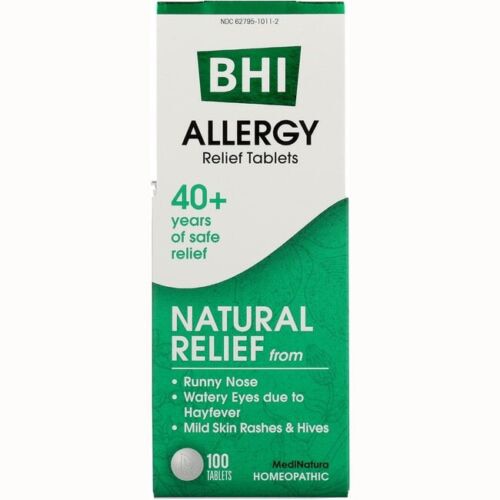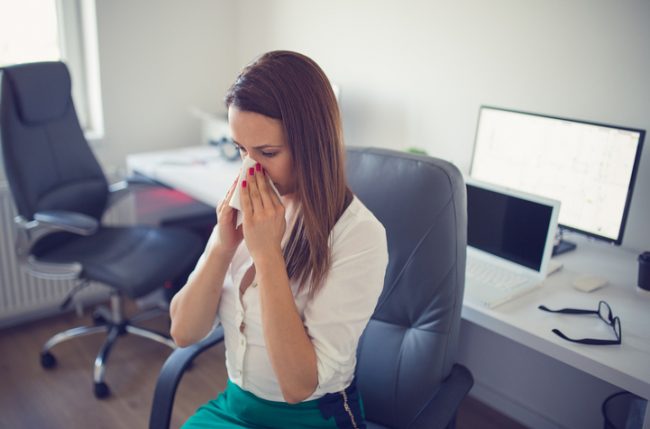You’ve been looking forward to getting off the proverbial “bench” for months, so springtime is no time be sidelined. That said, it’s nearly impossible to alleviate or shield oneself from all of the varied irritants and allergens that the blooms of spring may bring. You can be vigilant, however, during allergy season.
As Old Man Winter begins to, once again, loosen his annual, frigid grip and spring is finally in the air, consider these tips to curb some allergy-courting behaviors in which you may be an unwitting participant.
1. Stressing out 24/7
Are you spending a majority of your days making the rounds in a giant, whirling ball of stress? If the answer to that one was a resounding, “yes,” guess what? A.) You’re not alone and B.) You’re potentially making your allergies worse. In fact, according to a study published in the Annals of Allergy, Asthma & Immunology, those who were already allergy sufferers were found to be compounding their symptoms when hindered by persistent stress.
“Stress can cause several negative effects on the body, including causing more symptoms for allergy sufferers,” said allergist Amber Patterson, M.D., lead study author. “Our study also found those with more frequent allergy flares also have a greater negative mood, which may be leading to these flares.”
Sounds like a vicious cycle. Doing things to offset the stressors of daily life, such as implementing a regular workout regimen, incorporating a nightly sleep hygiene schedule to overcome sleep trouble and deep breathing exercises are all great places to start mitigating the misery seasonal allergies can cause.
2. Taking your workout outdoors
Though this may seem counterintuitive to the introduction, and the cabin fever you have is completely understandable, making a beeline for an outdoor workout may not be the move if you’re a seasonal allergy sufferer. Be sure to check your local pollen counts and air quality index, as well as pay close attention to what your body is telling you.
With strenuous aerobic workouts, such as running, you’ll be breathing deeper, and thusly taking more allergens into the lungs. And if you’re already sensitized to irritants such as pollens or mold spores, that’s not good. If you’re noticing tell-tale allergy attack signs, such as a runny nose, itchy eyes or throat, during or post-workout, you may want to stick to the air-conditioned confines of the gym and save those long outdoor runs for days on which pollen counts are low.
Related products: NatraBio Allergy Relief and Similsan Allergy Eye Relief
3. Not showering before bed
Ever get ready to leave the house in springtime and notice that your car is awash in a sea of bright-yellow pollen? Then just imagine that same allergy-inducing pollen sprinkled on your body and getting into your hair as you make your way about town on a beautiful spring day.
One sure-shot way to wake up with the sniffles is going to bed with said pollen on your person. The particles become embedded in your hair and on skin throughout the day and can trigger your allergy symptoms even after you’ve settled in back home. By making sure to give your body, hair and scalp a vigorous wash before bed, you’re one step closer to keeping those pesky pollen-induced allergy symptoms at bay.
4. Consuming certain fruits, veggies & nuts
The American College of Allergy, Asthma & Immunology defines Oral Allergy Syndrome as “caused by cross-reacting allergens found in both pollen and raw fruits, vegetables, or some tree nuts. The immune system recognizes the pollen and similar proteins in the food and directs an allergic response to it.”
In essence, if you are susceptible to certain pollen allergies, such as birch, ragweed or grass, some fruits, nuts and vegetables may trigger an itchy mouth, scratchy throat, or swelling of the lips, mouth, tongue and throat. Itchy ears may also come into play.
Listed below are some of the triggers, corresponding allergens and foods that the ACAAI notes on their site. Avoid these if you notice symptoms during or soon after consumption of the following:
Birch pollen: apple, almond, carrot, celery, cherry, hazelnut, kiwi, peach, pear, plum
Grass pollen: celery, melons, oranges, peaches, tomato
Ragweed pollen: banana, cucumber, melons, sunflower seeds, zucchini
Related product: Herb Pharm Pollen Defense
5. Skipping spring cleaning
You had all winter to hibernate and shirk those cleaning duties and now it’s time to pay the piper. Keeping dust and other allergens to a minimum inside your home is a major mantra to remember now that spring is almost here.
You may be tempted to open windows and doors at the first sign of springtime sunshine, but, beware, as these invite copious amounts of dust and pollen directly into your abode.\
Cleaning, dusting and wiping down surfaces regularly when pollen counts are high is a prominent first line of defense against allergies on the homefront.
Related product: J.R. Watkins All-Purpose Wipes




